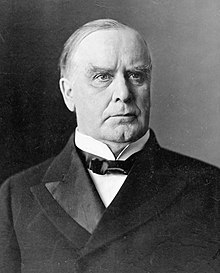
Back رئاسة وليام ماكينلي Arabic Kabinett McKinley German Présidence de William McKinley French הקבינט של ארצות הברית בממשל ויליאם מקינלי HE Presidenza di William McKinley Italian Kabinet-McKinley Dutch
 | |
| Presidency of William McKinley March 4, 1897 – September 14, 1901 (Assassination) | |
| Cabinet | See list |
|---|---|
| Party | Republican |
| Election | |
| Seat | White House |
|
| |
| Library website | |
The presidency of William McKinley began on March 4, 1897, when William McKinley was inaugurated and ended September 14, 1901, upon his assassination. A longtime Republican, McKinley is best known for conducting the successful Spanish–American War (1898), freeing Cuba from Spain; taking ownership of the Republic of Hawaii; and purchasing the Philippines, Guam and Puerto Rico. It includes the 1897 Dingley Tariff which raised rates to protect manufacturers and factory workers from foreign competition, and the Gold Standard Act of 1900 that rejected free silver inflationary proposals. Rapid economic growth and a decline in labor conflict marked the presidency and he was easily reelected.
The 25th United States president, McKinley took office following the 1896 presidential election, in which he defeated Democrat William Jennings Bryan. In the campaign, McKinley advocated "sound money", promised that high tariffs would restore prosperity, and denounced Bryan as a radical who promoted class warfare. He defeated Bryan again in the 1900 presidential election, in a campaign focused on imperialism in the Philippines, high tariffs, and free silver. McKinley's presidency marked the beginning of an era in American political history, called the "Fourth Party System" or "Progressive Era", which lasted from the mid-1890s to the early 1930s. On the national level, this period was generally dominated by the Republican Party.
In 1897–1898, the most pressing issue was an insurrection in Cuba against repressive Spanish colonial rule which had been worsening for years. Americans sympathized with the rebels and demanded action to resolve the crisis. The administration tried to persuade Spain to liberalize its rule but when negotiations failed, both sides wanted war. American victory in the Spanish–American War was quick and decisive. During the war the United States took temporary possession of Cuba; it was promised independence but it remained under the control of the U.S. Army throughout McKinley's presidency. The status of the Philippines was heavily debated, and became an issue in the 1900 election, with Democrats opposed to American ownership. McKinley decided it needed American protection and it remained under U.S. control until the 1940s. As a result of the war, the United States also took permanent possession of Guam and Puerto Rico. Under McKinley's leadership, the United States also annexed the independent Republic of Hawaii in 1898. Unlike the other new possessions, citizens of Hawaii became American citizens and Hawaii became a territory with an appointed governor. McKinley's foreign policy created an overseas empire and put the U.S. on the world's list of major powers.
In 1897 the economy rapidly recovered from the severe depression, called the Panic of 1893. McKinley's supporters in 1900 argued that the new high tariff and the commitment to the gold standard were responsible. Historians looking at his domestic and foreign policies typically rank McKinley as an above average president. Historian Lewis L. Gould argues that McKinley was "the first modern president":
He was a political leader who confirmed the Republicans as the nation's majority party; he was the architect of important departures in foreign policy; and he was a significant contributor to the evolution of the modern presidency. On these achievements rest his substantial claims as an important figure in history of the United States.[1]
© MMXXIII Rich X Search. We shall prevail. All rights reserved. Rich X Search
